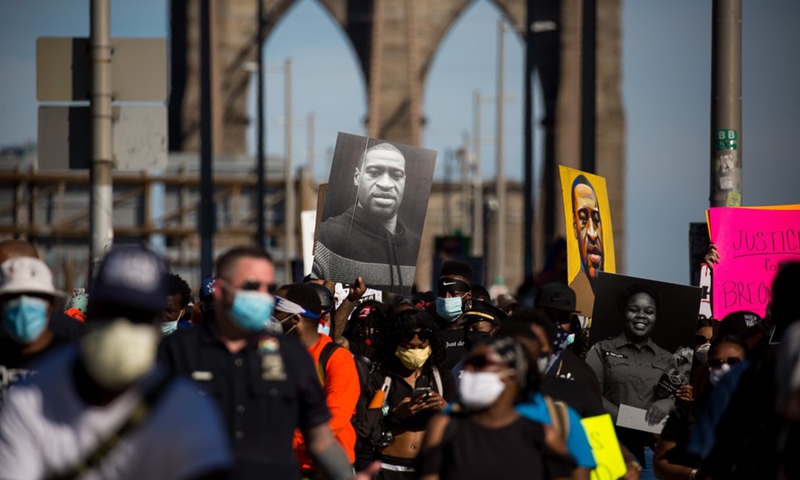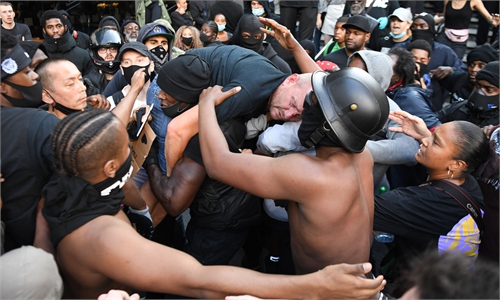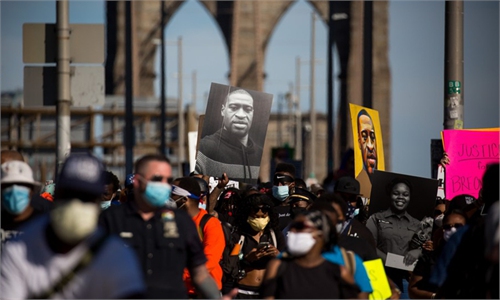
Demonstrators take part in a protest sparked by the death of George Floyd across the Brooklyn Bridge in New York, the United States, June 13, 2020. Photo: Xinhua
By now, the waves from the anti-police brutality protests in the US have reached every corner of American society. Even Chinese living in America, not known for being vocal on topics unrelated to their own community, have been getting involved in discussions about systematic racism — just not in ways you might expect.
Before the death of George Floyd drew the world's attention to racism against the black community in America, Chinese people in America were suffering as a result of racism in similar ways.
In fact, COVID-19 was publicly labelled the "Chinese virus" by President Donald Trump. It was at this time that Chinese and Asian-Americans who donned masks in self-protection back in March were threatened, as racists screamed obscenities and, in some cases, those masked individuals were physically and verbally attacked, oftentimes being called "a virus" themselves.
In light of recent events, the Chinese community in America should have shown empathy for America's black community, fighting police brutality and systemic racism; however, things haven't transpired in such a way. While many young Chinese in America have participated in protests and chanted "Black Lives Matter," they have generally found it difficult to persuade their older Chinese family and friends to stand together in the fight against minority injustice.
When a young American-born Chinese student at Yale penned an open letter to "the parents and the community," calling for them to stand with the Black Lives Matter (BLM) movement, she was met with responses from older Chinese telling her she was "brainwashed" by an American liberal college education.
What's more, when a group of young people recently visited New York Chinatown's shops and restaurants to distribute window stickers that declared the shop's support for BLM, less than half of the 20 shops they approached agreed to post them on their storefronts.
On WeChat, discussions can get very heated and, oftentimes, ugly. As such, there has been fierce criticism against the subsequent riots and looting that have accompanied some of the most recent BLM protests, and thinly-veiled racist comments have been spread across one of China's most popular social media platforms.
This reaction is partly triggered by fears of what the ongoing protests may lead to, particularly any reforms of the police, that could reduce security for residents and businesses in major cities, but it also reflects the complex relationship that has long existed between Chinese and black communities in America.
During the civil rights movement in the latter half of the 20th century, the country's Asian and black communities worked very closely together. Grace Lee Boggs, the late Chinese-American activist, married black activist James Boggs in the 1950s, and fought for the rights of the black community throughout her entire life. In the 1980s, when a young Chinese man, Vincent Chin, was killed by two white auto factory workers in Detroit who thought Chin was Japanese, and therefore held him responsible for the threat to their jobs from Japanese automakers, black activists in America stood together with Asian protesters to fight for justice.
But distrust between ordinary people from the two communities has existed for some time, and has been exacerbated in recent years as a rapidly increasing number of Chinese immigrants have made some Chinese move from heavily-saturated Chinese neighborhoods to instead open businesses in more traditionally black neighborhoods.
In the early years of the new millennium, several bone chilling murder cases involving Chinese deliverymen, who were killed in predominantly black neighborhoods, made the Chinese community rethink their impression of the black community. There have also been tensions stemming from cultural differences, where arguments have taken place between Chinese shop owners and black customers.
In addition, the controversies caused by Ivy League universities' adoption of Affirmative Action in their admissions policies, and New York City's push for specialized high school reform, have caused many Chinese parents to believe their own children's opportunities are reduced in an attempt to increase the number of black and Hispanic students in the country's best schools.
All of these issues have hurt the feelings of both black and Chinese people, and add salt to an already wounded relationship. However, I wonder whether the damage is exacerbated by American society's tendency to scrutinize incidents that involve minorities through a racial prism.
I recently talked to Liu Jian, a Chinese educator who taught at a predominantly black high school in Harlem for four years after receiving his Master's degree in 2012. As the only Asian teacher at the school, Liu was regularly asked by students whether he eats dogs, and encountered vicious stereotypes as a math teacher when students told him that he (being Chinese) was born to be good at math.
To Liu, none of this appeared to be racist, and he instead took each of these questions as opportunities to discuss the cuisine cultures of different countries, and connect with students about how he failed his own midterm in college before eventually receiving an A- for the course by not giving up and working harder.
When Liu showed me a picture of a note one of his students left on the black board at the end of a semester, I realized how effective his approach actually was; that is, it said: "Stop talking. Mr. Liu is cool. He loves everyone! Math is cool once you understand!"
But in a racially charged America, we often don't get the opportunity to consider each other's perspective, before being dragged into a preformed narrative of racial conflict. Instead, this predisposition only makes tensions that much worse.
The author is a New York-based journalist and Alicia Patterson fellow. rong_xiaoqing@hotmail.com


